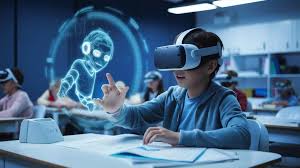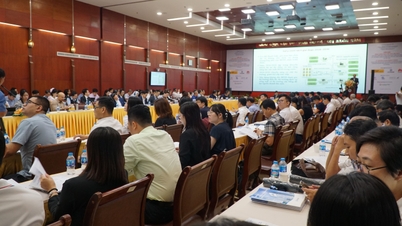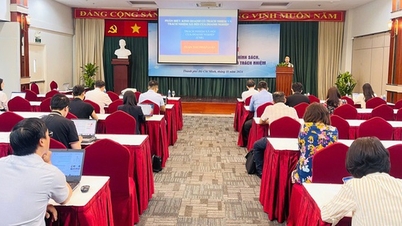AI and the holistic development of learners
Artificial intelligence (AI) is profoundly changing the way people learn and teach. From supporting lesson creation, grading, analyzing learning data to predicting individual student progress, AI has become a "knowledge partner" in the modern educational ecosystem. However, according to Associate Professor Dr. Tran Thanh Nam - Vice Rector of the University of Education (VNU), bringing AI into schools cannot stop at "technology application", but must be based on the scientific foundation of learning - that is, understanding how people actually receive, remember, reflect and create knowledge.
According to Associate Professor Tran Thanh Nam, without this foundation, education can fall into the "illusion of knowledge" where students have the right answers but do not think, and students complete essays fluently without ever learning how to analyze, express or ask questions. AI can do a lot for us, but if we let AI learn for us, humans will lose the ability to truly learn.
Humans have not only linguistic or logical intelligence – which AI can easily simulate – but also emotional, social, kinesthetic, aesthetic and self-aware intelligence. These abilities are only formed through real human experiences and interactions.
Associate Professor Tran Thanh Nam said that AI can help students learn faster and write better, but it cannot replace emotions and the ability to self-regulate behavior. Therefore, the introduction of AI into education must go hand in hand with the development of human qualities and emotional intelligence. "AI can expand access to knowledge, but educators still need to orientate towards comprehensive human development - where knowledge, emotions and moral values are trained at the same time," he said.

Illustration photo
AI must be integrated based on the science of learning.
When used properly, AI can personalize learning, identify struggling students early, automate administration, or simulate virtual classrooms. This makes learning more flexible and adaptive.
However, Associate Professor Tran Thanh Nam warned that overusing AI will lead to many risks: illusion of ability, deterioration of writing and critical thinking skills, reduced motivation for self-study, dependence on the convenience of machines. Along with that are ethical risks, information distortion and reduced social interaction, making learners lonelier. "When learning becomes too easy with AI, learners lose the opportunity to think deeply and mature," Associate Professor Tran Thanh Nam commented.
So the goal of education is not to make learning easier, but to help people learn more deeply, to question, to reflect, and to persevere through the "necessary difficulties" of learning.
According to Associate Professor Tran Thanh Nam, education in the AI era needs a scientific approach to learning. AI applications must serve the thinking process, not replace it; help reduce cognitive load, maintain learning motivation and encourage social cooperation. AI should support expression, stimulate thinking, not create mechanical replication.
He gave an example: in primary school, AI should not be taught as a tool, but should be taught to children about social understanding, ethics and logical thinking related to AI – forming a culture of "understanding AI" as a second language.
For older students, AI can be taught through experience. For example, when baking with AI, students can choose ingredients based on the machine’s suggestions and then taste them themselves to decide which batch is better. From there, they understand that AI can make suggestions, but humans are the ones who make the decisions. Or when learning through drawing, teachers can have students compare hand-drawn drawings with AI-generated ones. AI drawings may be more beautiful, but they lack emotion. In this way, students understand that AI learns from humans, but emotional creation is something that machines cannot replace.
According to Associate Professor Nam, instead of considering AI as a "replacement", education should consider AI as a "co-intelligence partner". AI takes on the "fast and broad" part - processing data, suggesting ideas; while humans take on the "deep and human" part - thinking, feeling, criticizing, and making ethical decisions. When these two capacities are combined, the learning process becomes more effective and humane.
Notes for effective AI application in education
According to Associate Professor Tran Thanh Nam, to effectively apply AI to general education, it is necessary to focus on the following contents:
- Building an AI competency framework for teachers and students, including understanding, limitations, and responsible use.
- Incorporate "AI Education" into the general education curriculum, helping students understand how AI operates and its impact, instead of just learning programming.
- Strengthening digital capacity for teachers, considering learning material design and AI application as officially recognized tasks.
- Innovate testing and assessment, shifting from knowledge testing to assessing thinking and creative abilities.
- Develop ethical regulations when using AI, ensuring transparency, proper citation and preventing academic fraud.
- Develop a digital learning ecosystem where AI is integrated into management and suggests appropriate learning resources.
- Create a pilot "sandbox" for AI in education – allowing testing of virtual teaching assistant models or simulated classrooms with pedagogical supervision.
The Vice Rector of the University of Education said that these solutions not only help Vietnamese education catch up with international trends, but also ensure that the application of AI is suitable for the cultural characteristics, psychology and philosophy of humanistic education in Vietnam.
AI in Education: Don't Let Machine Learning Replace Humans
AI opens up a new learning space – where students can learn anywhere, anytime, at their own pace. But without a foundation in the science of learning, education can lose its core: the ability for people to think for themselves and grow.
Associate Professor Dr. Tran Thanh Nam emphasized, "AI is only truly meaningful when it serves comprehensive human development - helping students become smarter, more creative, but also humane and responsible. Integrating AI cannot rely solely on technology, but must be based on educational science, so that technology serves humans, not replaces humans."
Source: https://mst.gov.vn/he-sinh-thai-giao-duc-trong-lan-song-ai-197251108173135719.htm























































































![Dong Nai OCOP transition: [Article 3] Linking tourism with OCOP product consumption](https://vphoto.vietnam.vn/thumb/402x226/vietnam/resource/IMAGE/2025/11/10/1762739199309_1324-2740-7_n-162543_981.jpeg)












Comment (0)